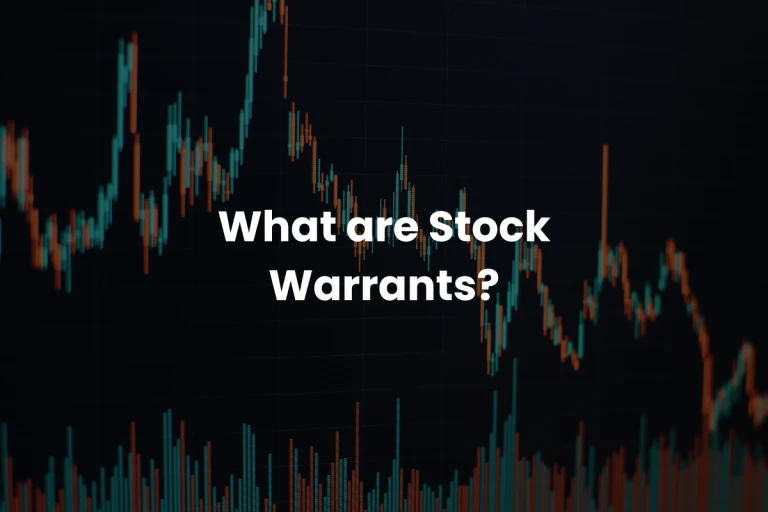What are Stock Warrants and How to Buy them?
In this comprehensive guide, we'll delve into the intricate world of stock warrants. We'll unravel the fundamentals, explore how warrants differ from options, examine their mechanics, and shed light on their potential advantages and risks. By the end, you'll have a clear understanding of what stock warrants are, how they function, and how they might fit into your investment strategy.

What are Stock Warrants?
A stock warrant represents an agreement between an investor and a company, conferring the investor with the privilege to purchase or sell the company's stock within a designated timeframe at a predetermined price. Functioning as a derivative contract, its value derives from the underlying asset, offering a unique avenue for investors to potentially capitalize on future market movements.
How do Stock Warrants Work?
A stock warrant is a financial tool granting its holder the right, though not the obligation, to purchase or sell a predetermined quantity of a company's shares at a set price within a specified period. Known as the "strike price," it mirrors a call option on a company's stock. In the realm of stock warrants, American variants permit exercising at any point during the stipulated duration, including the expiration date, whereas European warrants allow exercise solely on the expiration date itself.
Why do Companies Issue Stock Warrants?
Firms often issue warrants to raise capital swiftly. Through the sale of stock warrants, companies secure immediate funds and anticipate additional revenue upon warrant exercise. These warrants serve as an enticement for investors, enticing them with the prospect of amplified returns when buying the company's stock. Additionally, companies utilize warrants as a perk for employees, fostering retention, and use them as incentives to attract fresh talent into their ranks.
Types of Warrants
Types of warrants encompass two primary categories: call warrants and put warrants. The distinction lies in their functionality:
Call Warrants:
Among the most prevalent, call warrants grant the holder the right to purchase a stock at a predetermined price within a specified timeframe, culminating on the warrant's expiration date. For instance, suppose you possess a call warrant for Company A, featuring a $75 strike price, and the warrant expires in six months. If the stock price remains at $75 or below during this period, it's prudent to let the warrant lapse. However, should the stock price surge, say to $105, exercising the warrant allows you to procure the stock at $75, resulting in a $30 per share gain.
Put Warrants:
In contrast, put warrants provide the privilege to sell a specific quantity of shares back to the issuing company at a predetermined strike price. Optimal utilization of put warrants involves a scenario where the stock's market price falls below the strike price, enabling profitable selling. Selling when the stock price surpasses the strike price would result in losses. In the previously mentioned example, if the stock plummets to $40, selling at the $75 strike price would yield a $35 profit.

How do you Buy Stock Warrants?
Stock warrants can be acquired and traded via a brokerage account, similar to other securities. Yet, due to their relatively lower trading volume compared to stocks, locating a brokerage offering warrants might entail some research.
Another avenue for obtaining stock warrants is through special purpose acquisition companies (SPACs). Typically, SPAC initial public offerings (IPOs) furnish investors with "units," comprising shares and warrants, or fractional warrants. Details on warrant redemption are outlined in the investment prospectus, a comprehensive document delineating the investment particulars. However, delving into SPAC investments necessitates caution, as they pose risks. This terrain is generally better navigated by seasoned investors equipped to withstand potential financial setbacks.
Stock Warrants Vs. Stock Options
Stock warrants and stock options, although akin in some respects, diverge in several key aspects:
Issuer: Warrants originate from a company, whereas options are generated by investors and traded within the secondary market.
Duration: Warrants boast longer expiration periods, ranging from five to even ten years or more. Conversely, options contracts tend to be short-term, often featuring terms under a year.
Purpose: Companies leverage stock warrants primarily to secure capital, whereas investors utilize stock options as speculative instruments for potential gains in the market.
What Happens to Stocks When Warrants are Excercised?
Upon warrant exercise, the holder either purchases or sells shares at the predetermined strike price. When a warrant holder exercises by buying, it compels the underlying company to issue new shares, leading to dilution for existing shareholders due to the increased number of outstanding shares. This potential dilution might exert downward pressure on the company's stock price. However, it's crucial to note that warrant exercise is merely one element among many influencing daily stock prices. Variables such as market conditions, the volume of exercised warrants, and numerous other factors collectively determine the day-to-day fluctuations in a stock's value.
Also read: Government's Counter-Fraud Plan: 4-Hour Window to Reverse Online Payments above ₹2,000
The Bottom Line
Stock warrants offer companies a means to secure funds and grant investors a potential avenue for profit. Nevertheless, akin to many investments, they harbor inherent risks. It's paramount to thoroughly comprehend their mechanisms and assess whether your financial standing can withstand the associated risks before delving into stock warrants. Making informed decisions empowers investors to navigate this terrain more effectively, mitigating potential drawbacks and optimizing the potential benefits warrants may offer.
Follow us on Instagram.









